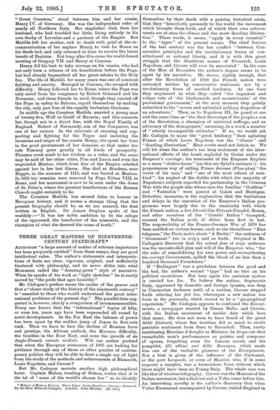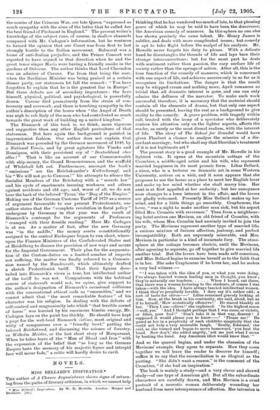ALTHOUGH " a large amount of matter of extreme importance has
been purposely omitted" from these essays, they are good intellectual value. The author's statements and interpreta- tions of facts are clear, vigorous, original, and sufficiently tinctured with philosophy, and he never slides into what Mommsen called the " dressing-gown " style of narrative. When he speaks of his work as "light sketches" be is surely moved by "the pride that apes humility."
Mr. Cadogan's preface warns the reader of the graver sort that a " closer study of the history of the nineteenth century" is " essential to those who would understand the great inter- national problems of the present day." The parallel thus sug- gested is, however, clearly a comparison of incommensurables. Every one knows that the " international " topics of fifty, or even ten, years ago have been superseded all round by novel developments. ' In the Far East the balance of power has been upset by the sudden jump of Japan to first-rate rank. Then we have to face the decline of Russian force and prestige, the African outlook, the Morocco difficulty, the troubles in the Near East, and even the growth of an Anglo-French entente cordiale. Will our author pretend that when the European statesmen of 1905 are looking for guidance through any of these or other puzzles of contem- porary politics they will be able to draw a single ray of light from the study of the methods and achievements of Bismarck, Louis Napoleon, and Cavour P But Mr. Cadogan mounts another high philosophical horse. Captain Mahan, treating of Nelson, writes that it is the lot of " some of the world's chosen few " so to identify
* Makers of Modern Hi,'ory. Three Types, Louis Napoleon—Cavour—Bismarck. By the Hon. Edward Cadogan. London John Murray. [8a. net.]
themselves by their deeds with a passing historical crisis, that they "henceforth personify to the world the movement which brought them forth, and of which their own achieve- ments are at once the climax and the most dazzling illustra- tion." These words, it seems, " apply in every essential" to the " types " of the present essays. The chief feature of the last century was the hot conflict " between Con- servative principles and the revolutionary forces of con- stitutional or national liberty, and it is with this great struggle that the illustrious names of Bismarck, Louis Napoleon, and Cavour will ever be associated." In the case of the Man of December the author's dogma seems to be upset by his narrative. He shows, rightly enough, that after the Revolution of 1848 the French nation were animated neither by. conservative sentiment nor by a revolutionary force of marked tendency. At one time they acquiesced in what they called "the impudent and vulgar rule of ' the blackguards and mountebanks' of the provisional government," at the next moment they quietly submitted to the " severe and unlimited military despotism of an adventurer." Then, as to Napoleon III., he posed at one and the same time as "the elect Sovereign of the people, a son of the Revolution, a champion of universal suffrage, and an adversary of the demagogues," assuming, in a word, a number of " utterly incompatible attitudes." If so, we would ask Mr. Cadogan to name the " great tendency " then agitating France of which Louis Napoleon was the " climax " and " dazzling illustration." Mere errata need not detain us. We will let alone the author's too hazy statement of the inter- national effects of the bomb exploded by Orsini under the Emperor's carriage : his treatment of the Empress Eugenie as a mere " clothes-horse " (on this see Sybel's estimate !): his preposterous way of calling Prince Jerome (Plon-plon) " the worst of his race," and " one of the most odious of man- kind": his neglect of the dislike with which the majority of Napoleon's subjects regarded his partnership in the Crimean War with the people into whose ears the familiar " Goddam" and " Vatterloa " were poured at Calais and Boulogne. Defective, moreover, is the explanation that the hesitations and delays in the execution of the Emperor's Italian pro- gramme were largely due to the unanimity with which the French nation, a few literati like Prevost-Paradol, Renan, and other members of the " Comite Italien " •xcepted, scorned the Italian grido di dolore from first to last. The responsibility of the Franco-German War of 1870 has been saddled on various horses, such as the threadbare "Ems telegram," the Paris mob's shout "A Berlin!" the rashness of " Grammont " (sic in orig.), and so forth. Original is Mr. Cadogan's discovery that the actual fans et origo malorunt was the uncontrolled plan and will of the Emperor, who, " for the sake of consolidating his own power and strengthening his corrupt Government, spilled the blood of no less than a hundred thousand Frenchmen."
If " Badingnet " was a pendulum between the good and the bad, the author's second " type " had no blot on his political escutcheon. But here again the omission system is carried too far. To believe the author, degenerate Italy, oppressed by domestic and foreign tyrants, was deep in Cimmerian darkness until, of a sudden, Cavour stepped forth uttering his fiat lux, whereupon a new nation was born in the peninsula, which ceased to be a " geographical expression." Mr. Cadogan appears to confound the Risorgi- mento, a newspaper started by Cesare Balbo and Cavour, with the Italian movement of earlier date which bore that name. He does not seem to have heard of the great Abbe Gioberti, whose fine treatises did so much to excite patriotic sentiment from Susa to Stromboli. Then, curtly .mentioning Massimo d'Azeglio as Minister, he drops out that remarkable man's performances as painter and composer of operas, forgetting even his famous novels and his pamphlet, Gli ultimi casi della Romagna, which made him one of the veritable pioneers of the Risorgiotento. Not a hint is given of the influence of the Carbonari, or the poet Leopardi, or even of Mazzini, who, if in some respects a marplot, was a tremendous force, without which there might have been no Young Italy. The whole case was like that of wireless telegraphy. Cavour was the Marconi of the Italian movement, but a Galvani and a Volta came before him. An interesting novelty is the author's discovery that when Victor Emmanuel, accompanied by Cavour, visited England in
the course of the Crimean War, our late Queen "expressed so much sympathy with the aims of the latter that he called her the best friend of Piedmont in England." The present writer's knowledge of the subject runs, of course, in shallow channers compared with Mr. Cadogan's information, but he ventures to hazard the opinion that our Court was from first to last strongly hostile to the Italian movement. Balmoral was a home of anti-Italian prejudice, and the Prince Consort was reported to have argued in that direction when he and the great tenor singer Mario were having a friendly smoke in the gardens of Osborne. The author thinks that Lord Clarendon was an admirer of Cavour. Far from that being the case, when the Sardinian Minister was 'being praised at a certain dinner party, our statesman let fall the remark : "Yon have forgotten to explain that he is the greatest liar in Europe." But these defects are of secondary importance : the hero himself, physical, political, and psychological, is powerfully drawn.' Cavour died prematurely from the strain of con- troversy and overwork, and there is touching sympathy in the author's description of the hours when " the Angel of Death was nigh to rob Italy of the man who had contributed so much towards the great work of building up a united kingdom."
The Bismarck of this book is, we think, more vigorous and suggestive than any other English portraiture of that statesman. But here again the background is painted in impressionist fashion. Our author does not explain that Bismarck was preceded by the German movement of 1848, by a National Verein, and by great agitators like Vincke and Bennigsen, with their persistent cry of "Deutschland fiber alles !" That is like an account of our Commonwealth with ship-money, the Grand Remonstrance, and the scaffold of Whitehall left out. Furthermore, amongst the book's " omissions " are the Reichskanzler's Kulturhampf, and his " We will not go to Canossa!" his attempts to silence the Socialist Members of the Reichstag with a "muzzle law" and his cycle of enactments insuring workmen and others against accidents and old age; and, worst of all, we do not Lear the bark of the beloved Tyres,' the " Dog of the Empire." Making use of the German Customs Tariff of 1879 as a source of argument favourable to our present Protectionists, our author states that the "complete revolution in fiscal policy" undergone by Germany in that year was the result of Bismarck's contempt for the arguments of Professors " cramped with their fireside reading." Here Mr. Cadogau is at sea. As a matter of fact, after the new Germany was "in the saddle," the money assets constitutionally assigned to the central Exchequer began to run short, where- upon the Finance Ministers of the Confederated States met at Heidelberg to discuss the provision of new ways and means for the Imperial Government. Their plan for the augmenta- tion of the Custom.-duties on a limited number of imports not sufficing, the matter was finally referred to a Commis- sion named by the Bundesrath, which ultimately drafted a sketch Protectionist tariff. That their figures dove- tailed into Bismarck's views is true, but intellectual author of the tariff he was not. Comparisons with the habitual course of statecraft would not, we opine, give support to the author's designation of Bismarck's occasional collisions with the conventional ethical code as "enormities," and we cannot admit that " the most remarkable feature " of his character was his religion. In dealing with the defects of self-control and magnanimity into which " that terrible cornet of horse" was hurried by his enormous kinetic energy, Mr. Cadogan lays on the paint too thickly. He should have kept a page for the well-bred Bisinarck intime, most original and witty of companions over a "friendly bowl," patting the beloved Reichshund, and discussing the science of forestry, or Wilhelm Meister, or the last short story of Maupassant. When he takes leave of the " Man of Blood and Iron" with the expression of the belief that "as long as the German Empire lasts the memory of his majestic figure and intrepid face will never fade," a critic will hardly desire to cavil.
NOVELS.



































 Previous page
Previous page